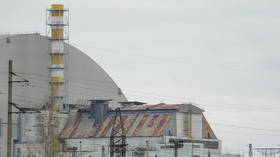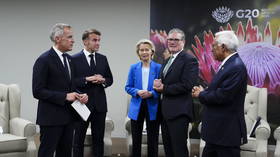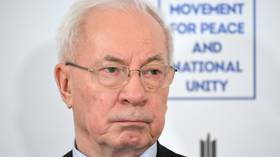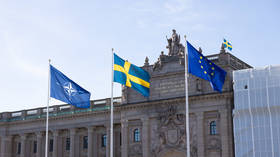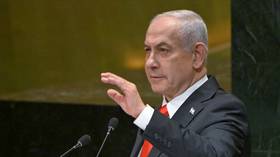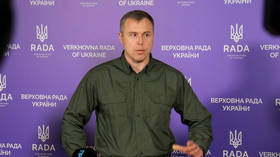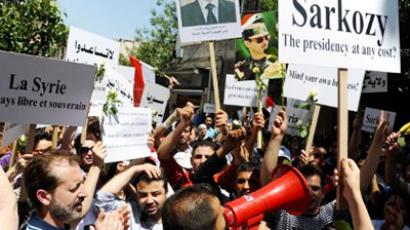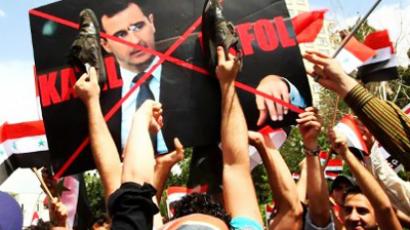Syrian president calls for national dialogue "in face of conspiracy"
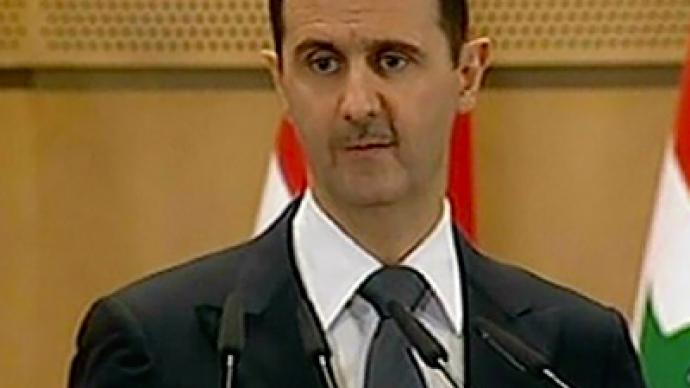
President Bashar al-Assad has addressed the nation amid mass riots in Syria. He calles for a national dialogue and promises large-scale reforms, saying only unity will allow the violence to be stopped and people’s demands to be addressed.
According to Assad, the majority of Syrian protestors are simple people concerned with real problems like a lack of political representation, social injustice, corruption of the authorities and economic troubles.The president said some 64,000 people are suspected of taking part in the riots. The number was shocking for him, he said, and he wants to expand the current amnesty to allow the people to lay down arms and be cleared of charges.He added the tension was used by a small group of “saboteurs”, whose only goal is chaos in the country. They are extremists and bandits, who are hijacking the public dissent and spreading the violence, Assad says, adding that their actions are part of a foreign conspiracy targeting Syria and its people.He cited as an example of such sabotage the events in Jisr al-Shughour, a city with a population of 44,000, which was the site of a major battle in early June. Syrian government says the city was attacked by a well-armed group of gunmen, who killed many security officers and were only pushed out by a large Syrian army force. Some protesters say it was a violent government crackdown on demonstrators.“We admit the fairness of the peaceful demonstrators’ demands, but we will not allow them to use their discontent to spread violence in the country,” Assad said.In his speech, the Syrian president called for a national dialogue to discuss details of the needed reforms and said a committee on this has been established.Among the moves the government suggests are the implementation of a multiparty political system, better representation of the people in regional and national assemblies, a wide-scale anti-corruption campaign and reform of the media legislation, which would give them a greater role in monitoring officials’ actions and mediating between the government and the people.Assad sees the laws as being signed by the end of August, when Syria will have a new parliament, or by end of November, if the parliamentary election is postponed by three months, as some people have suggested. He stressed that the government is committed to pushing the reforms.“Some people say that there may be delays in implementing the reforms, that the reforms are not serious. It’s not true. The reforms are in the interests of our fatherland and no sensible person would go against the will of the people,” he said.The president added that a constitutional reform or adoption of an entirely new constitution is also on the table, if that idea is supported through the national dialogue process.Earlier, Russian Foreign Minister Sergey Lavrov called on the Syrian opposition to be responsible and open a dialogue with the government.“We are concerned that recently the Syrian opposition gathered for a meeting in Antalya, Turkey, and said it would not have any negotiations, any dialogue with the Syrian government. This is a bad position. It goes contrary to the goals of defusing the situation, and we will not support it. We will work in the opposite direction,” he said."Russia will do everything it can to prevent the Libyan scenario happening in Syria. Together with the international community we can urge Bashar Asad to put the reforms into practice as soon as possible and to call on the opposition not to ignore suggestions to discuss these reforms, but to start negotiating them," Lavrov added.On Monday the EU members have expressed their disappointment with Bashar al-Assad’s latest speech and what they called his “vague” promises of change. The bloc announced that, due to increasing violence against the opposition in Syria, it was preparing further sanctions on the country.Broader sanctions could include further asset freezes and restrictions on companies associated with the Syrian regime, both of which might be approved by Thursday and Friday. In May the EU introduced a ban on Bashar al-Assad and some other Syrian top officials from traveling to its countries, also announcing that they were subject to asset freezes.
If Europe introduces serious economic sanctions on Syria, the next step might be military intervention, believes Joshua Landis, a director with the Center for Middle East Studies.“Europe has about 40 per cent of the trade with Syria. They take a lot of Syrian oil,” he said. “If Europe wanted to starve Syria, they could do it in the same way that Europe starved Iraq. Of course, once you go down that road, if the government does not crumble – as it did not do in Iraq – than you have to take military intervention.”
According to Pierre Guerlain, political science professor with Paris West University, it would be unfair to put all the blame for the Syrian unrest on foreign states. ”There might be some people trying to destabilize Syria, but there is also, obviously, popular dissatisfaction with the dictatorial regime,” he said. “Of course, Assad would blame everything on, maybe, foreign conspiracies, but local people cannot be happy with a very authoritarian and murderous dictatorship.”


